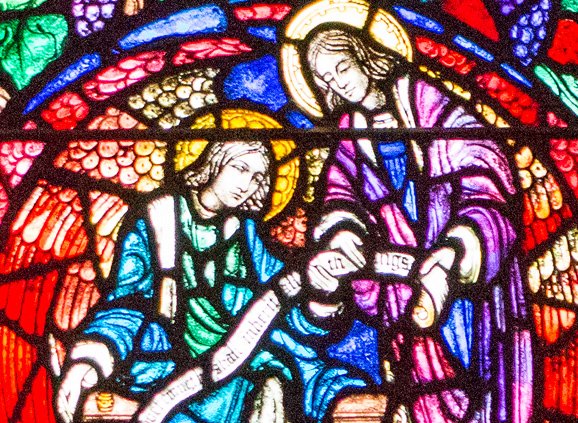
- Education Forums
Bible Study Guide for Fifth Sunday of Easter

[Acts 7:55-60, 1 Peter 2:2-10, John 14:1-14, Psalm 31:1-5, 15-16]
For a few years in my career as a middle- and high-schooler in Colorado, I attended the Episcopal Diocese of Colorado’s spring and fall youth camps outside Buena Vista. One year the spring theme was “Taste and See that the Lord is Good,” referencing the verse from Psalm 38 that Saint Peter alludes to in the first line of today’s Epistle reading. I still vividly remember the two-man rock band that played on stage for the large-group programming that weekend and for the Sunday morning worship. The band members were two goofy, youth group leader-type dads in their 40s who must have practiced in their garages on the weekends. They had clearly been excited to write catchy theme music for the weekend to entertain us tweens and make Christianity “cool.” I could still sing you the chorus to that song, as I did while reading the Epistle today: “Taste and see that the Lord is good, He’s got milk and honey for YOU!”
Unfortunately I was in a phase where I thought Christian rock was uncool, and I giggled a bit as we sang along with the words on the projector screen that weekend. Yet I still remember that song and those two rock band dads all these years later. I wonder why?
Likely it has at least a bit to do with being there at a formative time in my youth, plus the power of a catchy tune. But sometimes these experiences are the building blocks of faith in ways we can’t quite understand. I’ve long since forgotten those men’s names if I ever knew them, and I have no idea where life has taken them; but I now understand their style of worship as a genuine expression of their faith. Their commitment to spend a weekend on stage at a church youth camp, singing for and preaching to and praying with a crowd of teenagers, has bound me that much closer to Scripture and to the church. We make those connections one living stone at a time, and by them our faith comes into shape.
We could say much the same about Saint Peter and the psalm of David he quotes here. This letter of the New Testament is attributed to Peter, a man who we know was raised Jewish. The psalms would have been deeply familiar to him from whatever religious education he received, as well as from regular exposure in services at temple or at home. They would have been the building blocks, the underlying rhythm of his life. They continued to serve him well as he walked with Jesus and shared His good news with others. King David, who lived long before Peter, became a stone at the base of Peter’s “spiritual house.”
That house is still being built today on an ever-grander scale, each time we come to church even though we don’t really feel like it, each time we reach out to check on a friend we haven’t heard from in a while, each time we pray and invoke the communion of all the saints. From David to Peter to us, those who have gone before us and those who live alongside us are the living stones that build one another up to be the Church. I mean this in a broader sense: while the institutional church has been my faith home since birth and it brings me much joy, it’s an institution filled with human division and failings. Christ’s Bride, Jesus’s eternal Church, is the mystical body that exists outside time and across denominations, bringing us spiritual growth through the leading of the Holy Spirit.
– Betsy Noecker
What formative experiences have stuck with you in your journey as a Christian? Name one or two in particular.
Who has been a living stone to you recently? This could be someone living or dead.
When is a time when you felt like a member of the mystical Church, the larger body of Christ?
- January 2024
- December 2023
- November 2023
- October 2023
- September 2023
- June 2023
- May 2023
- April 2023
- March 2023
- February 2023
- January 2023
- December 2022
- November 2022
- October 2022
- June 2022
- May 2022
- April 2022
- March 2022
- February 2022
- January 2022
- November 2021
- October 2021
- September 2021
- August 2021
- July 2021
- June 2021
- May 2021
- April 2021
- March 2021
- February 2021
- January 2021
- December 2020
- November 2020
- October 2020
- September 2020
- August 2020
- July 2020
- March 2020
- February 2020
- January 2020
- December 2019
- November 2019
- October 2019
- September 2019
- August 2019
- July 2019
- June 2019
- May 2019
- April 2019
- March 2019
- February 2019
- January 2019
- December 2018
- November 2018
- October 2018
- September 2018
- August 2018
- July 2018
- June 2018
- May 2018
- April 2018
- March 2018
- February 2018
- January 2018
- December 2017
- November 2017
- October 2017
- September 2017
- July 2017
- May 2017
- April 2017
- March 2017
- February 2017
- January 2017
- December 2016
- November 2016
- October 2016
- September 2016
- August 2016
- May 2016
- April 2016
- March 2016
- February 2016
- January 2016
- December 2015
- November 2015
- October 2015
- October 2013
- September 2013
At "Educational Forums," enrich your spiritual journey by exploring our resources including videos of lectures, essays by priests, and other pieces about our faith, our church, and what it means to be a disciple of Jesus in the 21st century.


Comments